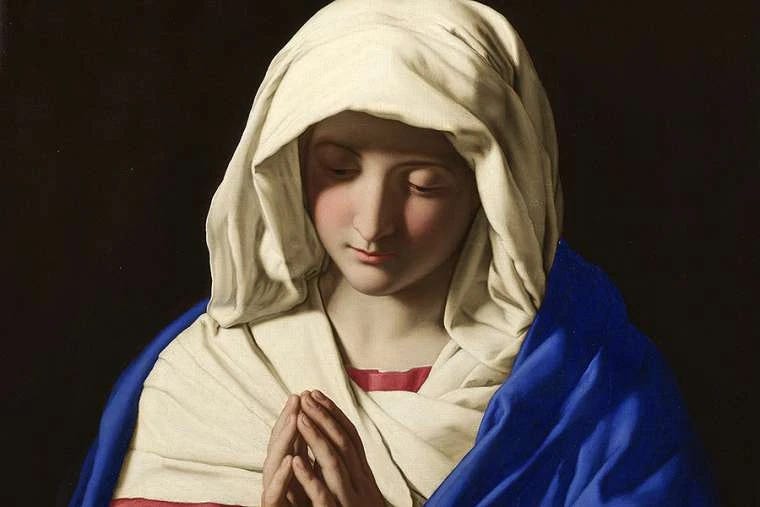Mary is the Cure
The Immaculate Conception as an Antidote to Modern Confusion
When Blessed Pius IX solemnly defined the dogma of the Immaculate Conception in 1854, many thought it was an otherworldly concern, a matter of speculative theology fit for monks and scholars but irrelevant to the problems of modern man. Yet providence always runs ahead of history. The mid-nineteenth century was already the cradle of materialism, rationalism, and the rising secular myth that man was master of his own destiny. Karl Marx had just published The Communist Manifesto. Charles Darwin was preparing On the Origin of Species. Nietzsche would soon declare that God was dead. In this cultural moment, the Church spoke with clarity: here, in the person of Mary, is revealed the truth of human identity, human dignity, and human destiny. Mary was declared to be “full of grace” from the first instant of her conception. In her, we see what man was meant to be, what woman was created to be, and what humanity is destined for in Christ.
Today, the proclamation of the Immaculate Conception stands as a burning lamp against the abyss of our age. Ours is a world drowning in confusion. The sexual revolution has metastasized into the transgender revolution. Philosophers call this radical constructivism: the claim that human identity is a mere social invention. Psychologists speak of expressive individualism, the belief that the self is most authentic when it asserts its inner feelings against external reality. Politicians, activists, and even educators have baptized this ideology, teaching children that they can invent themselves ex nihilo, without nature, without God, without covenant. Yet history testifies, and the blood of the twentieth century confirms, that every revolt against reality is a revolt against the human person, leaving only brokenness in its wake.
Against this tide, the Church lifts up Mary of Nazareth, conceived without sin, the woman whom Gabriel salutes not by name but by identity: Kecharitomene, “the one who has been filled with grace.” This single word in Luke 1:28 is not a mere pleasantry. It is a covenantal proclamation. It identifies Mary not according to her self-assertion, but according to the truth of God’s creative and redemptive action. She is not what she has constructed; she is what God has made her to be. In her, the lie of self-invention is unmasked, and the glory of divine intention is revealed.
The Modern Lie of Self-Construction
The philosopher Jean-Paul Sartre, in his atheistic existentialism, declared that “existence precedes essence.” According to this dictum, man is born without nature, without meaning, and must invent himself through his choices. This, more than any slogan of politics, is the seed of modern confusion. It is the denial of natural law. It is the erasure of the Creator. It is the enthronement of will as god. From this philosophical poison springs the psychological dogma of our age: that feelings constitute reality, that desire defines identity, and that nature must be mutilated to serve the will.
But the fruits of this lie are despair. The transgender movement, which preaches liberation, produces instead skyrocketing rates of depression, anxiety, and suicide. No civilization has ever been more “affirming” of these identities, yet no generation has ever been more miserable. Why? Because lies, even when shouted with the full voice of the state, remain lies. The soul cannot be nourished by unreality. When the serpent whispered to Eve that she could “be like God” by grasping at self-determination, the result was not divinity but death. Every attempt to construct a new self apart from God repeats that primordial rebellion, and the consequences are written on the very flesh of our broken world.
The Remedy in the New Eve
In the Immaculate Conception, God reveals His counter-proclamation. Mary is not self-invented; she is divinely prepared. Where Eve reached out to seize what was not hers, Mary receives what is given. Where Eve distrusted the Father, Mary believes. Where Eve grasped at false freedom, Mary bows in true liberty: “Be it done unto me according to thy word.” Mary is humanity restored. She is the New Eve, immaculate not by her will but by God’s prevenient grace. In her, essence precedes existence, and identity is gift, not construction.
This is why the Fathers of the Church called her the “Second Eve.” Irenaeus wrote: “The knot of Eve’s disobedience was untied by Mary’s obedience; what Eve bound by her unbelief, Mary loosened by her faith.” Mary unmasks the false freedom of the modern age. She shows that human flourishing is not found in rejecting God’s order but in receiving it. She is the antidote to relativism because she embodies objective truth. She is the antidote to nihilism because she radiates meaning. She is the antidote to gender ideology because she reveals the beauty of femininity not as arbitrary construct but as covenantal vocation.
The Psychology of Grace
The modern therapeutic culture tells us that self-esteem comes from self-definition. But the Immaculate Conception tells us that peace comes from grace. Mary’s identity is secure not because she invented herself, but because God declared her to be full of grace. In psychological terms, Mary embodies what researchers call secure attachment—not rooted in fragile self-assertion, but in perfect trust of the Father. She is free from the anxious compulsion to prove herself, free from the depressive despair of meaninglessness, because she rests entirely in God’s providence. Every human heart longs for this peace. Every restless soul is searching for the security that Mary already enjoys. Her immaculate state is not an alien exception to humanity but its fulfillment.
Marian Doctrine as Cultural Medicine
Consider the ideologies that dominate our institutions:
Gender ideology says the body is meaningless. Mary proclaims the body as temple of the Spirit.
Relativism says truth is a construct. Mary embodies objective truth, chosen and sanctified by God.
Nihilism says life has no meaning. Mary reveals life as covenant, as participation in divine love.
Marxism and critical theory say identity is determined by power structures. Mary shows that identity flows from God’s grace, not social revolution.
Every heresy of the present moment is refuted in the person of the Virgin. This is why Marian devotion is not a sentimental distraction but a civilizational necessity. As St. Louis de Montfort proclaimed, “Through Mary the salvation of the world was begun, and through Mary it must be consummated.” To honor Mary is to honor the truth about man. To deny Mary is to deny ourselves.
Covenant Fulfillment
The Immaculate Conception is not an isolated miracle. It is the flowering of the covenant. God promised that the seed of the woman would crush the serpent’s head (Genesis 3:15). That promise could only be fulfilled if the woman herself was preserved from the serpent’s grasp. Mary’s immaculate soul is the down payment of the new and eternal covenant sealed in Christ. In her we see that God’s plan is not simply to pardon sinners but to create saints. His covenant is not merely juridical but transformative. He does not merely cover sin; He conquers it at its root.
This is the hope our world has forgotten. Ideologies promise liberation through self-creation, but only covenant brings true freedom. Nations legislate identities, but only God gives names that endure. Social movements promise utopia, but only grace produces paradise. Mary is the living sign that the covenant is not theory but reality, not symbol but flesh.
The Call of the Hour
What then is the task for Catholics today? It is to proclaim Mary with new urgency, not as a relic of medieval piety but as the blueprint for the new humanity. We must teach our children that their identity is not self-authored but God-given. We must witness to the culture that true freedom is found in fiat, not in rebellion. We must build communities that honor the feminine genius, not in competition with masculinity but in covenantal complementarity. Above all, we must entrust ourselves to Mary’s intercession, for she alone, after Christ, has been fully victorious over the serpent.
In 1858, just four years after the dogma was declared, Our Lady appeared to Bernadette at Lourdes and identified herself: “I am the Immaculate Conception.” It was as if heaven itself confirmed that the world, hurtling into the confusion of modernity, would need this truth above all. Today, amid transgender ideology, moral relativism, and nihilistic despair, her words resound as the answer to our identity crisis. She is not self-invented. She is not socially constructed. She is not a product of will or culture. She is what God has made her: Kecharitomene, full of grace. And in her, we see what we are called to become.
The Immaculate Conception is not an abstract dogma. It is the antidote to the modern disease. In Mary shines the eternal truth: man cannot save himself, but God can sanctify him. We cannot invent ourselves, but God can make us new. The serpent whispers that we can be our own gods. Mary proclaims, by her very being, that only in God do we find ourselves. In her immaculate light, the night of our confusion is dispelled, and the dawn of covenantal truth rises again.






Yes! I have been arguing this as well. But not nearly as eloquently and thoroughly as you. Thank you. She is the antidote for our age. 🙏🏼